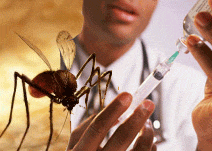Michael Fumento
Factual · Powerful · Original · Iconoclastic
Biotech Bullets
August 19, 2002 · Michael Fumento · Tech Central Station · PharmaWest Nile Virus has now spread to at least 36 states and is about to officially qualify as an epidemic. It actually kills very few of its victims, but it’s scary because Americans have for decades now seen mosquitoes as only pests, not killers.

Yet our outbreak is a mere prick of the proboscis compared to the havoc the insidious insects wreak world-wide. Malaria alone afflicts people in some 90 nations, according to the World Health Organization, causing between 700,000 and 2.7 million deaths annually. Low-tech containment efforts such as insecticide spraying obviously work, but just as obviously they don’t work well enough. Biotechnology, however, will soon be taking a swat at the blood-suckers.
Oxford University scientists have developed the first vaccine to target the malaria parasite inside human cells. Previous vaccines against the disease have been unusable, in great part because they have only been able to attack the parasite before it enters the cell.
"Instead of using the malaria parasite itself, inactivated in some way, we are actually using DNA, the genetic material," lead researcher Adrian Hill told BBC Radio. "That gene makes a tiny part of the malaria parasite when it is used as a vaccine." Rather than futilely trying to kill the parasite before it gets into the cell, the new vaccine is designed to destroy from the inside.
Early safety trials showed the vaccine was safe and that it produced a strong immune response in recipients. Now it’s being tested on many people in the African nation of Gambia. "We’re pretty hopeful that we will see the same [response] in Gambia and that the vaccine will be effective at preventing malaria," said Hill.
There are also biotech bullets that have the West Nile Virus’s name on them.
Acambis, Inc., based in both Cambridge, Massachusetts and Cambridge in the UK, is developing a West Nile vaccine based on genetically modifying a live yellow fever vaccine that’s been in use for over 60 years. They stripped off its molecular protein envelope and replaced it with that of the West Nile virus.
The vaccine is part of a family called ChimeriVax for the Chimera, a creature from Greek mythology with the head of a lion, the body of a goat and the tail of a serpent. The company is using the same technology to develop a vaccine for numerous other terrible mosquito-borne illnesses, such as Japanese encephalitis and dengue fever.
But speed is the key here. In the past the development of such a vaccine might take 10 years or more. (The first hepatitis B vaccine, which also uses gene-splicing technology, took 17 years to develop.) Acambis expects human trials of its West Nile vaccine to begin early next year.
Based on the company’s success with similar gene-spliced vaccines, there’s every reason to believe this one will succeed. But if it doesn’t, another is in the pipeline.
This one was developed by removing key genes from the dengue virus and replacing them with West Nile genes. Because the hybrid vaccine is mostly dengue it doesn’t target the central nervous system like West Nile does.

Hundreds of thousands of children die each year from malaria.
The researchers, at the National Institute of Allergy and Infectious Diseases (NIAID) and Walter Reed Army Institute of Research, also used a strain proven not to harm people. The added West Nile genes are just enough to stimulate a response against the disease. When injected into mice, the vaccine protected all of the animals from subsequent exposure to the New York West Nile strain.
Along with developing genetically-altered anti-mosquito vaccines, biotech researchers are working on altering the mosquito as well.
A team led by Professor Marcelo Jacobs-Lorena at Case Western University in Cleveland, Ohio inserted a synthetic gene into the mosquito’s gut, trapping the parasites in the insect’s gut. The gene is integrated into the mosquito’s germ line, meaning it’s passed from generation to generation.
Because it has no effect on the ability of mosquitoes to either breed or feed, it won’t induce the evolution of resistant insects. The biotech mosquitoes will still be little vampires, but they won’t be able to cause harm beyond raising an itchy welt.
The hope is to transfer the gene to the entire population of malaria-carrying mosquitoes. But there’s no reason to think that similar techniques couldn’t be used with other mosquito-borne parasites that carry other diseases, including West Nile.
Mosquitoes will always bite, but biotech can eliminate the sting of sickness and death.
